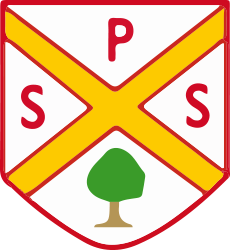SMSC
At St Paul’s C of E VA Primary School, we recognise that the personal development of our children, spiritually, morally, socially and culturally, plays a significant part in their ability to learn and achieve. We aim to provide an education that provides pupils with opportunities to explore and develop their own values and beliefs, spiritual awareness, high standards of personal behaviour, a positive, caring attitude towards other people, an understanding of their social and cultural traditions and an appreciation of the diversity and richness of the cultures.
We promote SMSC development everyday as part of the ethos of our school and through our curriculum. Here are just a few of the many enrichment activities the children participate in:
- Fundraising events
- School trips
- Anti-Bullying Week
- Festive concerts
- Church Services
- Enterprise Week
- Collective Worship
- Pupil Voice
- School Parliament
- Ambassadors and Pupil Leadership
- Creative Curriculum
- Class Assemblies
- Visitors to the school
- JIGSAW units
- Public Speaking
- Debating
- After School Clubs
- Year 6 Work Experience
- Bikeability
- Circle Time
- RE curriculum
- Sports fixtures
- Buddies and Peer Mentors
The spiritual development of pupils is shown by their:
- Ability to be reflective about their own beliefs, religious or otherwise, that inform their perspective on life and their interest in and respect for different people’s faiths, feelings and values.
- Sense of enjoyment and fascination in learning about themselves, others and the world around them.
- Use of imagination and creativity in their learning.
- Willingness to reflect on their experiences.
The moral development of pupils is shown by their:
- Ability to recognise the difference between right and wrong, readily apply this understanding in their own lives and, in so doing, respect the civil and criminal law of England.
- Understanding of the consequences of their behaviour and actions.
- Interest in investigating and offering reasoned views about moral and ethical issues, and being able to understand and appreciate the viewpoints of others on these issues.
The social development of pupils is shown by their:
- Use of a range of social skills in different contexts, including working and socialising with pupils from different religious, ethnic and socio-economic backgrounds.
- Willingness to participate in a variety of communities and social settings, including by volunteering, cooperating well with others and being able to resolve conflicts effectively.
- Acceptance and engagement with fundamental British values of democracy, the rule of law, individual liberty and mutual respect and tolerance of those with different faiths and beliefs; the pupils develop and demonstrate skills and attitudes that will allow them to participate fully in and contribute positively to life in modern Britain.
The cultural development of pupils is shown by their:
- Understanding and appreciation of the wide range of cultural influences that have shaped their own heritage and that of others.
- Understanding and appreciation of the range of different cultures within school and further afield as an essential element of their preparation for life in modern Britain.
- Knowledge of Britain’s democratic parliamentary system and its central role in shaping our history and values, and in continuing to develop Britain.
- Willingness to participate in and respond positively to artistic, sporting and cultural opportunities.
- Interest in exploring, improving understanding of and showing respect for different faiths and cultural diversity, and the extent to which they understand, accept, respect and celebrate diversity, as shown by their tolerance and attitudes towards different religious, ethnic and socio-economic groups in the local, national and global communities
